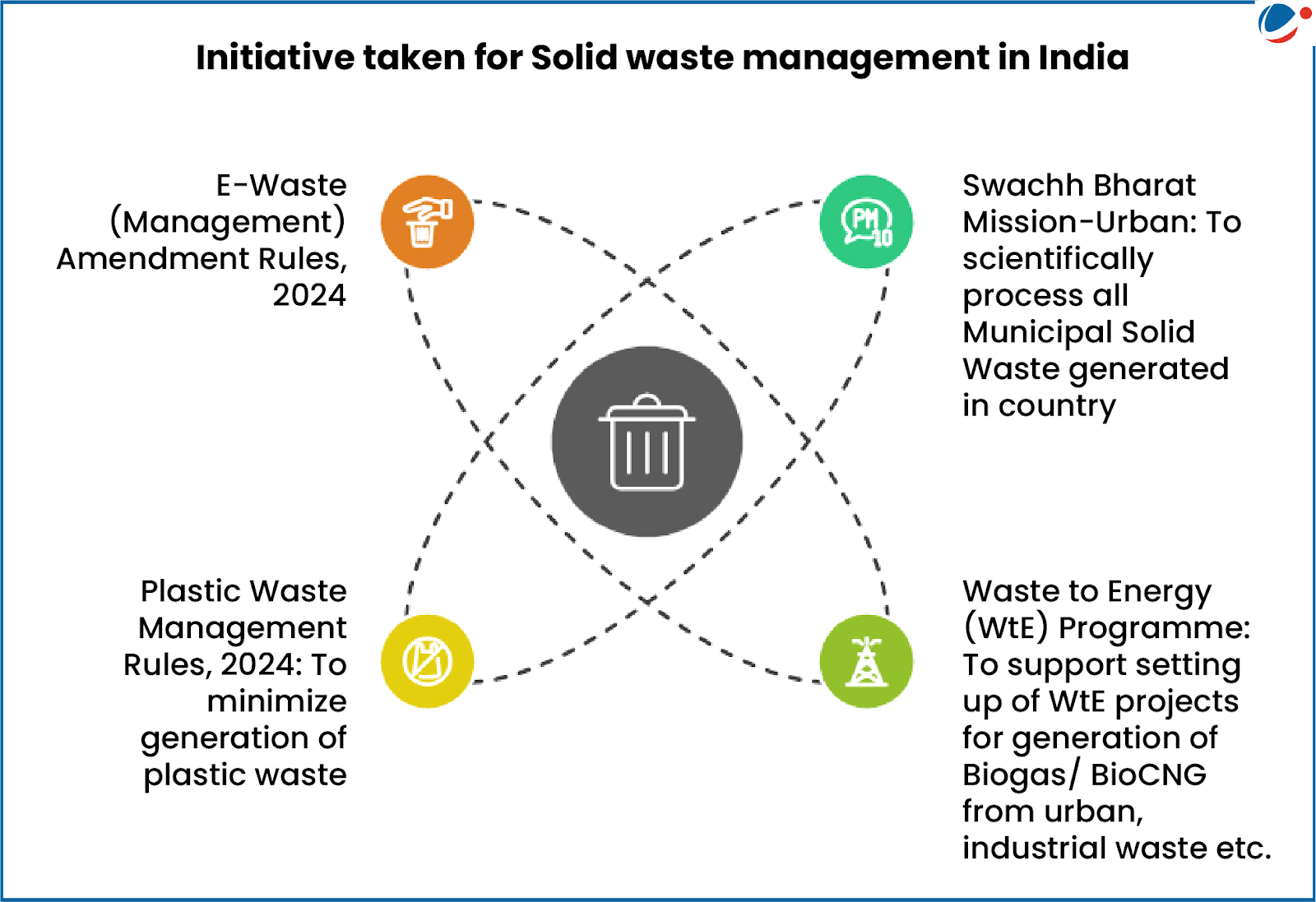India's National Highways Authority (NHAI) is addressing its municipal solid waste management crisis by segregating and integrating legacy waste into road construction by 2027.
India's municipal solid waste management crisis has found a solution through the National Highways Authority of India's (NHAI) initiative. With 62 million tonnes of waste generated annually, India faces challenges in solid waste management.
NHAI's plan to segregate legacy waste and integrate it into road construction by 2027 represents a landmark moment in infrastructure development. The convergence of waste management and infrastructure development aligns with India's sustainable development goals, offering a solution to two challenges facing the nation.
NHAI's Vision for 2027
The NHAI has embarked on a journey to transform India's waste management landscape. The Minister of Road Transport & Highways’s announcement in Nagpur highlighted the authority's commitment to segregating all legacy municipal solid waste across the country within five years.
NHAI has segregated and utilized 80 lakh tonnes of municipal solid waste from Delhi and Ahmedabad in road construction projects. This achievement represents waste disposal and an approach to infrastructure development.
The program operates under guidelines established by the Ministry of Road Transport and Highways (MoRTH), ensuring environmental compliance and technical feasibility. These guidelines address the use of inert materials and bio-mining of legacy waste, making the process environmentally sound and economically viable.
Integration with Swachh Bharat Mission 2.0
NHAI's waste utilization projects will integrate well with the Swachh Bharat Mission (SBM) 2.0 policy framework. This alignment ensures that waste management initiatives contribute to national cleanliness and sustainability objectives.
The SBM 2.0 policy emphasizes waste management practices, which complement NHAI's approach to waste segregation and utilization. This synergy creates an ecosystem where waste management contributes to infrastructure development.
Integration with Smart Cities Mission
The waste-to-road initiative also aligns well with India's Smart Cities Mission objectives. Smart cities require infrastructure solutions that address urban challenges.
Smart Cities and Circular Economy
The Smart Cities Mission emphasizes resource efficiency and circular economy principles. NHAI's waste-to-road approach directly supports these objectives by converting waste streams into construction materials. This integration reduces raw material consumption while addressing waste disposal challenges.
Technology Integration in Smart Cities
Smart cities leverage technology for urban management. The centralized online system mandated by the SWM Rules 2024 complements smart city digital infrastructure. Real-time monitoring of waste segregation and utilization can be integrated with city-wide management systems.
Infrastructure Optimization
Smart cities focus on infrastructure that serves multiple purposes. Roads constructed using processed municipal solid waste serve transportation needs while simultaneously addressing waste management. This dual-purpose approach maximizes urban land utilization and resource efficiency.
Citizen Engagement and Awareness
The Smart Cities Mission emphasizes citizen participation in urban governance. Waste-to-road projects provide visible examples of circular economy principles, educating citizens about waste segregation importance and environmental responsibility.
This integration creates opportunities for urban planning where waste management systems support infrastructure development while advancing smart city objectives through technology, sustainability, and citizen engagement.
Solid Waste Management Rules 2024: A Framework Change
The Ministry of Environment, Forest and Climate Change (MoEFCC) has notified the Draft Solid Waste Management Rules 2024, set to come into force from October 1, 2025. These rules represent an evolution in India's approach to municipal solid waste management.

Key Provisions of SWM Rules 2024
- Segregation Requirements: Every waste generator must now store construction and demolition waste in their premises. This provision supports NHAI's segregation initiatives by ensuring clean waste streams.
- Extended Producer Responsibility: Bulk waste generators must procure Extended Bulk Waste Generator Responsibility Certificates from local bodies. This mechanism ensures accountability throughout the waste management chain.
- Landfill Restrictions: Non-recyclable waste with calorific value of 1500 Kcal/kg or more cannot be disposed of in landfills. This provision encourages utilization methods, including road construction applications.
Technical Process in Waste-to-Road Technology
The integration of municipal solid waste into road construction involves bio-mining and processing techniques. This technology transforms organic waste into inert materials suitable for road foundations and embankments.
Bio-mining processes segregate recyclable materials, organic matter, and inert components from legacy waste dumps. The inert fraction, after treatment, meets MoRTH specifications for road construction materials.
This approach addresses environmental concerns. It reduces landfill burden, prevents groundwater contamination, and creates construction materials from waste streams.
Economic and Environmental Benefits
Cost Effectiveness
Utilizing municipal solid waste in road construction reduces material procurement costs. Road construction materials like aggregates and sand become expensive due to mining restrictions and environmental concerns.
The waste-to-road approach provides an alternative while addressing waste management costs that burden municipal budgets nationwide.
Environmental Impact
This initiative contributes to India's sustainable development goals, particularly SDG 11 (Cities and Communities) and SDG 12 (Consumption and Production).
The environmental benefits include:
- Reduced landfill requirements
- Lower carbon footprint from reduced mining activities
- Air quality improvement through reduced open burning
- Groundwater protection
Challenges in Municipal Solid Waste Management
Despite solutions like NHAI's initiative, India faces challenges in solid waste management:
- Infrastructure Deficits: Many cities lack collection and segregation infrastructure. The absence of segregation at source complicates downstream processing and utilization.
- Financial Constraints: Municipal corporations struggle with financial constraints affecting waste collection and transportation systems. These limitations hinder waste management implementation.
- Technology Gaps: Limited access to processing technologies prevents many regions from adopting waste utilization methods like those pioneered by NHAI.
- Informal Nature of Recycling: India's recycling sector is dominated by informal waste pickers and unorganized networks, which contribute significantly to waste recovery but lack safety standards, quality control measures, and integration with formal waste management systems, resulting in gaps in tracking and efficiency.
- Regulatory Compliance: Ensuring compliance with regulations requires capacity building and technical support for implementing agencies.
These interconnected challenges require coordinated efforts from multiple stakeholders to address. The success of initiatives like NHAI's waste-to-road program depends on overcoming these structural barriers through policy reforms, increased funding, and technology transfer mechanisms.
Future Roadmap and Implementation Strategy
NHAI's 2027 target requires scaling across all cities. The implementation strategy involves phase wise expansion, technology transfer and simultaneous capacity building.
This three-pronged approach ensures systematic waste processing capabilities across India. The combination of expansion, knowledge transfer, and skill development creates a foundation for achieving the 2027 target while maintaining technical standards and environmental compliance.
Conclusion
NHAI's approach to municipal solid waste management represents a shift in infrastructure development. By transforming waste from a burden into a resource for road construction, this initiative addresses national priorities.
The success of this initiative will influence India's ability to manage its growing waste challenges while meeting expanding infrastructure needs. NHAI's vision for 2027 represents waste management evolution and a transformation in how India approaches development challenges.

Master Digital Age Governance & Technology Trends with VisionIAS Comprehensive Current Affairs →
Visit the Mains Corner and elevate your UPSC Mains 2025 preparation.
NHAI Municipal Solid Waste Management FAQs
1. What is the target year set by NHAI to complete the segregation of all legacy municipal solid waste and use it in road construction?
Ans. 2027
2. Which two cities has NHAI already processed waste from for road construction?
Ans. Delhi and Ahmedabad
3. When do the new Solid Waste Management Rules 2024 come into force?
Ans. October 1, 2025
4. Which government mission does NHAI's waste-to-road initiative integrate with?
Ans. Swachh Bharat Mission 2.0
5. Which technology does NHAI use to convert organic waste into road construction materials?
Ans. Bio-mining